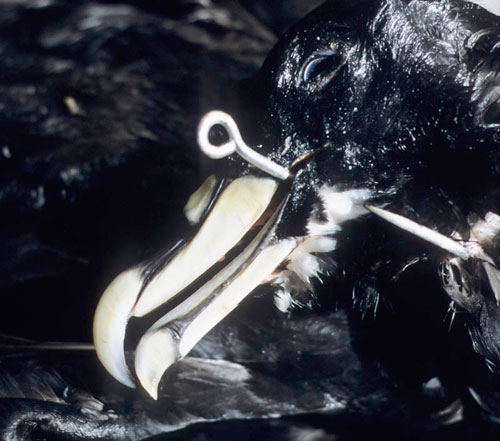In recent seasons the Patagonian Toothfish Dissostichus eleginoides longline fishery in CCAMLR Statistical Area 48.3 in the vicinity of South Georgia (Islas Georgias del Sur*) has commenced a few days earlier each year. The benefits of starting earlier include the chance of safer conditions at sea. After many years of negligible bycatch of seabirds in this fishery one vessel has reported catching 74 ACAP-listed White-chinned Petrels Procellaria aequinoctialis on a single longline set on 16 April this year.
In the early years of this fishery in the 1990s large numbers of albatrosses and petrels were killed and as a consequence the Commission for the Conservation of Antarctic Marine Living Resources (CCAMLR) introduced a number of measures to reduce the bycatch, including limiting the fishing season to winter months, restricting the setting of lines to darkness, ensuring lines sink quickly and enforcing the use of bird-scaring lines, resulting in a reduction of bird bycatch to close to zero. Following the introduction of these measures the fishery achieved Marine Stewardship Council certification.

A hooked White-chinned Petrel, photograph by Nicolas Gasco
Because of this success CCAMLR has, since 2010, approved an earlier start date for the season that has been incrementally and experimentally brought forward by five days each year. The incidental catch of White-chinned Petrels occurred on a line set during this experimental extension period. Mitigation measures in the fishery have now been adjusted so that vessels complete the setting of lines at least three hours before sunrise until 15 May to reduce the risk of incidental capture of any more White-chinned Petrels.
Report adapted from Penguin News, 25 April 2014.
With thanks to Sally Poncet for information.
John Cooper, ACAP Information Officer, 30 May 2014
*A dispute exists between the Governments of Argentina and the United Kingdom of Great Britain and Northern Ireland concerning sovereignty over the Falkland Islands (Islas Malvinas), South Georgia and the South Sandwich Islands (Islas Georgias del Sur y Islas Sandwich del Sur) and the surrounding maritime areas.

 English
English  Français
Français  Español
Español